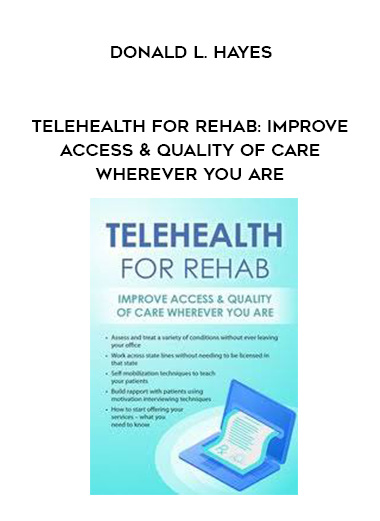TELEHEALTH FOR REHAB: IMPROVE ACCESS & QUALITY OF CARE WHEREVER YOU ARE – DONALD L. HAYES
Telehealth for rehabilitation is the way therapy is moving, especially for patients who are in rural settings and out of coverage for home health agencies. But many therapists find telehealth to be too challenging, wondering how to examine the patient correctly, provide manual therapy or basic treatment, how to get reimbursed, and build trust with patients. Some see it as a threat to their job security, thinking they’ll soon be replaced.
Instead of seeing tele-rehabilitation as a threat to your job security or as a delivery service with too many challenges, make it an opportunity to gain access to more patients and increase demand for your therapy, all while continuing to provide quality care wherever you and your patients are. Be ahead of the curve before it becomes even more widely used!
Learn all the ins and outs from the course presenter, who has been at the forefront of the cutting edge of telehealth for several years. You’ll learn how to increase your care with patients from afar by incorporating motivational interviewing techniques to better assess the problem and to build trust; teach self-mobilization techniques to your patients; provide exciting treatments to address musculoskeletal, neurological, cardiopulmonary, and various other conditions while enhancing the patient’s participation in therapy.
Learn how to bill and what software is available to increase accessibility. Your presenter will walk you through some real-life case examples so you can see how it works, from start to finish.
Be ahead of the telehealth curve. Gain confidence in using this delivery system in the most effective way so you can expand your practice now and still provide the best quality of care.
- Describe the types of tele-rehabilitation visits performed and how to apply each for individual patients
- Discuss appropriate patient selection for tele-rehabilitation.
- Demonstrate motivational interviewing techniques to enhance rapport and evaluation of the patient.
- Develop a musculoskeletal examination and treatment toolbox for tele-rehabilitation.
- Perform a simulated tele-rehabilitation visit for balance.
- Discuss how to perform ADL training, wheelchair assessment, and cognitive training.
Telehealth For Rehabilitation
How to Provide Service Wherever Your Patients Are
- What does the literature tell us about telehealth care vs traditional therapy?
- How it’s just as effective for your patients
- Various types of tele-rehabilitation
- Synchronous format – live interaction via video
- Asynchronous format – transfer of information electronically
- Rehab technician present – mix of the two
How to Get Started – From Start to Finish
- Set-up tele-rehab visit
- Emergency plan
- Ensure privacy and consent
- Deliver HIPA-complaint care
- Software built for telehealth
- What do current state regulations say?
- How do you select patients?
- Increase your network and referral base
- Billing and reimbursement strategies
- How to overcome the barriers that exist
- Advantages to tele-rehabilitation over traditional therapy
Get the Most Out of Interviewing Your Patients
Improve Your Assessment Skills
- How to ask better questions to get better answers
- Build rapport with your patients without being face-to-face
Assess and Treat Various Conditions With Telehealth
Musculoskeletal Conditions
- Conduct telehealth exam and treatment planning for:
- Neck
- Shoulders
- Back
- Hips
- Knees
- Ankle/feet
- Manual interventions
- LAB: patient interview and examination
Neurological Conditions
- Conduct telehealth exam and treatment planning for:
- CVA
- Parkinson’s disease
- SCI
- MS
- Vestibular
- Falls/balance
- Gait
- LAB: gait and balance
Cardiopulmonary Conditions
- Conduct telehealth exam and treatment planning for
- Getting vitals
Other Important Elements and Deficits to Consider
- ADL training and home safety evaluation
- Chronic pain
- Wheelchair positioning
- Treating cognition
Case Studies
Telehealth for Rehabilitation in Action
Future of Tele-Rehabilitation
Where Are We Headed, and How You Can Take Advantage Now?
- Continual ways tele-rehab evolves
- How to be successful using tele-rehabilitation
Tag: Telehealth for Rehab: Improve Access & Quality of Care Wherever You Are – Donald L. Hayes Review. Telehealth for Rehab: Improve Access & Quality of Care Wherever You Are – Donald L. Hayes download. Telehealth for Rehab: Improve Access & Quality of Care Wherever You Are – Donald L. Hayes discount.





